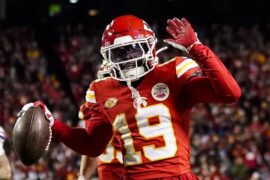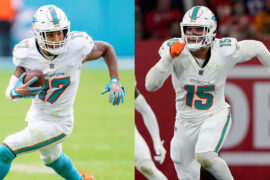Kansas City Chiefs wide receiver Rashee Rice is currently in hot water after being charged with eight felony counts following a street-racing incident in Dallas. As the Chiefs prepare to kick off their offseason program, there is uncertainty surrounding Rice’s attendance.
The final decision rests with the NFL and the Chiefs, who have the authority to prevent Rice from participating. The league could choose to place him on paid leave or suspend him without pay, while the Chiefs could simply ask him not to show up, and he may comply.
This situation is not unfamiliar to the Chiefs, as they previously made a similar decision with former receiver Tyreek Hill, who stayed away from offseason workouts during an investigation into his son’s broken arm. Despite no charges being brought, both the Chiefs and Hill agreed it was best for him to stay away during the process.
Given the circumstances, it would be wise for Rice to stay away from this year’s offseason workouts. Additionally, it is crucial for the league to take a strong stance against players engaging in reckless behavior that puts others at risk, as was the case with Rice.
While Rice’s actions may not have been intentional, they displayed a level of recklessness that is concerning. The NFL must send a clear message to all players that driving at high speeds among other vehicles is completely unacceptable.
Typically, the league avoids putting players on paid leave to avoid media scrutiny, but in this case, raising awareness on the issue could be beneficial. With the non-sports media already covering Rice’s case, it presents an opportunity for the league to issue a stern warning to players about reckless driving.
If the league fails to take action, the responsibility falls on the Chiefs to step up. Following the charges against Rice, the team chose not to comment initially. However, considering the severity of the situation, it is imperative for them to address the issue and take a firm stance.
In response to the incident, Chiefs president Mark Donovan made a statement that was later found to be inaccurate, claiming no one was injured.





